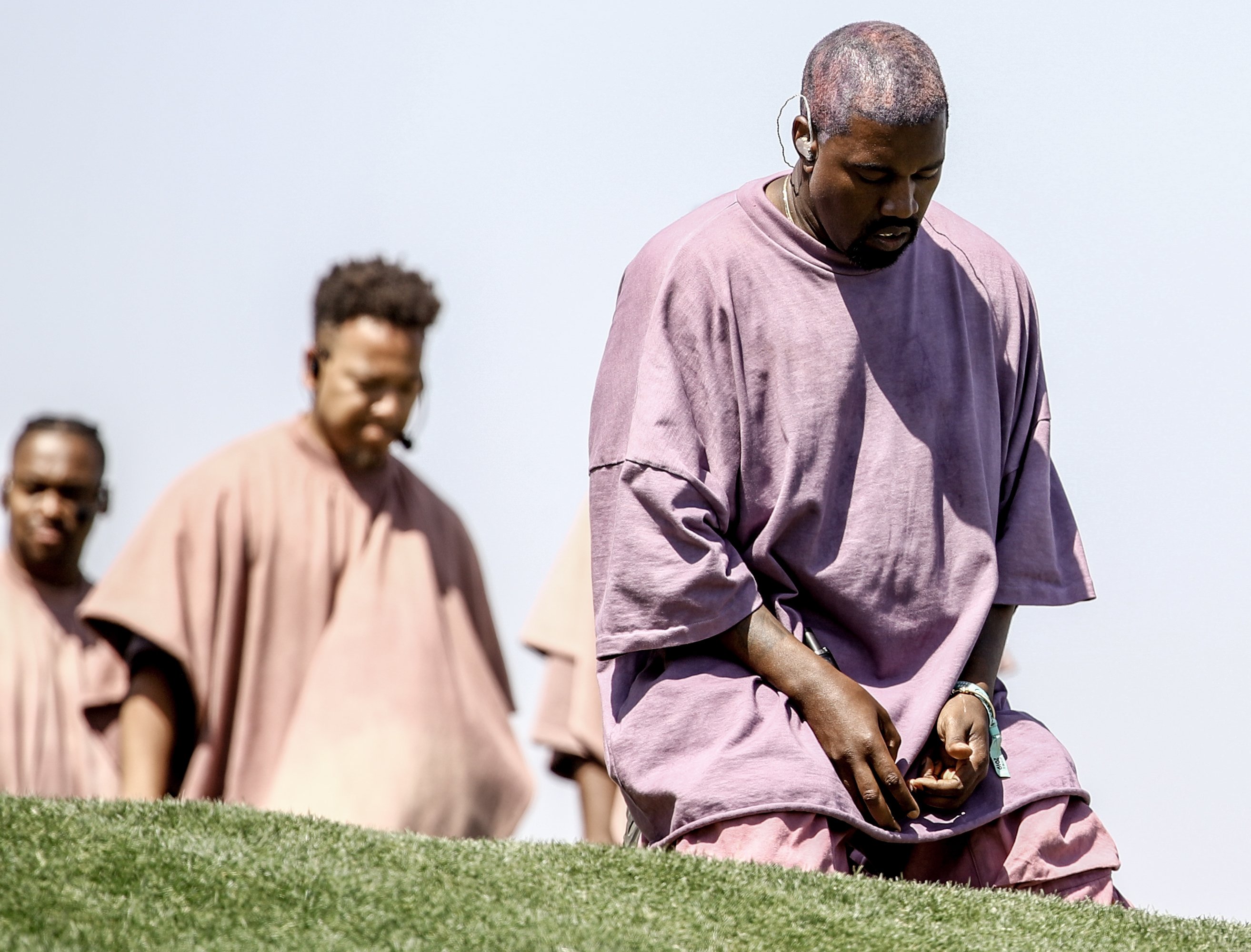In merely a decade, the release of a new Kanye West album has gone from being an eagerly anticipated cultural event to a frustrating exercise in trolling. I’m writing this on Monday, 30 September and the new Jesus is King, announced for the previous week, has failed to arrive.
By the time you read this it may, or may not, be out. In the meantime, it’s worth reflecting on West’s personal and professional downfall, and how it may be a cautionary tale for our era of Trump, social media derangement and late capitalism in freefall.
It’s worth remembering how great Kanye was in his prime, roughly the period between 2004 to 2013. From his early beginnings as a producer for other artists, he turned into the biggest rapper alive with The College Dropout and Late Registration. His cosmopolitan image and sound upended the dominant gangsta machismo of the time.
But that was just the beginning- after the tragic death of his mother in 2007, he adopted a darker aesthetic and personal persona. The result was his imperial period, a phenomenal run of albums which exploded conventional understandings of hip hop. There was 808’s and Heartbreaks (sad synth robot Kanye), My Beautiful Dark Twisted Fantasy (Pharaonic God- King Kanye) and Yeezus (blasphemous goth-industrial Kanye).
Grandiose, narcissistic and often transcendently beautiful, the origin of much of the weirdness and experimentation of contemporary hip hop can be found in these works. Rap has become the global dominant idiom of youth expression, from Tokyo to Johannesburg. Kanye, therefore not only shaped the aesthetic landscape of an entire genre, but arguably contemporary pop culture itself.
But in the last few years, his musical output has been overshadowed by his personal shenanigans. The list is almost endless but it’s worth noting his byzantine, petty feuds with Drake and Taylor Swift and his vocal support for abusers like Bill Cosby and XXXTentacion. But his nadir, to date, has been his enthusiasm for the racist, xenophobic regime of Donald Trump. In 2018, ahead of the release of the album Ye, Kanye began endorsing hard right figures like conspiracy theorist, Alex Jones. Echoing talking points used by white nationalists, he made the inflammatory assertion that chattel slavery was a choice for African-Americans. This culminated in his humiliating appearance in the Oval Office, where he ranted manically in front of the barely sentient president. For many former fans, this marked the cancellation of Kanye.
Sympathetic writers have suggested that Kanye’s struggles with bipolar disorder are responsible for his extreme political stances. But there was a more sinister dimension- Kanye was being actively courted by Republican operatives, eager to get a celebrity endorsement for their anti-migrant, anti-working class and anti-environmental policies. Whether he had been duped or not, Kanye had chosen the wrong side in a global cultural war where the Far Right is attempting to rebrand its regressive, toxic ideologies as edgy and transgressive.
Kanye backtracked from his Trump support, without really apologising. Rather than real contrition, it seems that he and his wife, Kim Kardashian were worried that it was going to affect the bottom line of their influencer personal empires. Along with his personal disgrace, the music began to suffer. When it was released last year, Ye turned out to be a lazy, underproduced irrelevancy. Not content with making the worst album of his career, Kanye then released “I Love It”, a collaboration with Lil Pump that may be one of the worst songs ever made. By anyone.
After promising, and then failing to deliver the follow-up album Yandhi, Kanye disappeared for a few months. He resurfaced this year with a new persona- Kanye West gospel singer/ aspirant cult leader. Religion has been a recurrent theme in his work- from Christian devotion, as in songs like “Jesus Walks” to hilariously unsubtle self-deification with ‘I Am A God’. But with his new Sunday Service events, where he performs his music outdoors to invited audiences, he has been playing the religious fervour to the hilt. For supporters, this is an act of contrition, Kanye rediscovering his spiritual roots after a long time in the wilderness. But for more cynical observers, it’s a PR stunt, an attempt to rebrand himself in the cloak of piety after being exposed as a detached, super-rich irritant.
Despite his fabulous wealth, Kanye appears to be a deeply unhappy, lost person. There is an important political dimension to his personal misery. Kanye’s career coincided with the peak and crisis of global neoliberalism, the ideology that holds that the unrestrained free market capitalism is the only viable means to organise society. This has connected the world in a culture of consumerism and hedonism. At one point, Kanye seemed like a poster child for neoliberal aspiration, who had reached the top of the celebrity tree through talent and drive. But his music was also haunted by a sense of melancholy, the palpable feeling that behind the glamour was a dangerously empty nihilism.
When it was released in late 2010, for example, My Beautiful Dark Twisted Fantasy sounded celebratory. It chimed with the brief optimism around the Arab Spring, where people felt that social media could be used to rapidly democratise societies.
But from the standpoint of a decade later, the album’s materialism and paranoia shine through. Rather than a paradise of freedom, we are experiencing the collapse of the neoliberal project- spiralling social inequality, endemic psychological anxiety, the rise of neo-fascism enabled by the internet (which Kanye allowed himself to become an enabler of) and the looming spectre of environmental collapse.
In the last decade, Kanye has increasingly embraced the worst aspects of contemporary politics, cozying up to racist fanatics and chasing clicks at the cost of decency and sanity. His slow decline reflects the broader crisis of our global system. It remains to be seen whether Jesus is King will mark a return to form, or just another signpost on his long, draining trip to irrelevancy.



















































